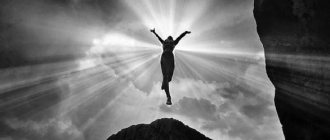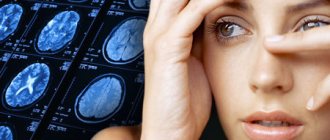What is psyche in human psychology?
Psyche in human psychology is one of the active forms of displaying objective reality, which is carried out by a specific subject integrated into society. Perception and processing of information occurs through interaction with environmental objects and highly organized living beings.
A distinctive feature of the presence of a healthy psyche in the psychological component of psychology is the action of the regulatory function, which takes part in the coordination of behavioral activity and compliance with generally accepted rules. In fact, this is the inner world of a person, the formation of which occurs throughout his life.
Basic ideas of Jung's theory
There are two personality types, characterized by a desire for extraversion (the psyche’s focus on the outside world) and introversion (a tendency toward introspection). And also the four components of consciousness - sensation, intuition, thinking and feeling.
Each person is endowed with a personal and collective unconscious. The first consists of the experience, history and experiences of a particular subject. The second includes ancestral memory, all the images and archetypes that have developed throughout evolution. People are able to perceive collective images in dreams or in the process of reading tales, myths and legends.
We all have an inherent desire for perfection - Jung called this process individuation. This desire to find harmony with the unconscious comes in the second half of life and manifests itself as a midlife crisis with the subsequent formation of a more holistic personality.
Dreams are born in the “comprehensive depths” in order to point out gaps in life, weak points and call us to overcome. This is how the personality gains stability (by eliminating the complexes indicated by dreams).
Scientific interpretation
The psyche in psychology is an individual property of the human body, which consists in the ability to independently perceive the world around us, construct an objective reality, as well as regulate one’s behavior and activities.
From a scientific point of view, the psyche is characterized by the presence of basic qualities in the form of integrity, psycho-emotional activity, desire for development and knowledge of the world around us, self-regulation of one’s actions, communication with other highly organized beings, and the ability to quickly adapt to new conditions.
The independent science of psychology studies the psyche and the processes it covers.
Body or psyche: what comes first?
According to generally accepted scientific theory, such a property of the human body as the psyche appeared at a certain stage of biological evolution.
The body was primary matter, which over the course of several thousand years went through multiple stages of its improvement and adaptation to new conditions of a constantly changing environment. As the brain grew and developed, the human central nervous system acquired new functionality.
Highly organized organisms have the opportunity to perceive the world more broadly, comprehend the information received, establish new communication connections, create their own picture of objective reality, and also make independent decisions in the current situation.
The emergence of the psyche played an important role in the further development of mankind. From a religious point of view, people were originally created with developed brain centers responsible for the presence of the psychic aspect and consciousness.
Properties of the psyche
Mental properties are a set of individual psychological characteristics inherent in an individual person, which determine his already formed methods of communication with environmental objects. This aspect includes interactions with inanimate objects as well as other people.
Mental properties are individually expressed qualities that are considered unchanged in the conditions of temporary space. At the same time, they can undergo radical changes under the influence of life experience, a number of biological factors, and the type of activity of a particular person.
The table below lists and also describes in detail the main properties of the psyche, the presence of which is characteristic of each person.
| Properties of the psyche | Description |
| Temperament | This property of the psyche is characterized by a direct influence on the mental and psycho-emotional qualities of a person. There are 4 main types of temperament, including melancholic, sanguine, phlegmatic and choleric. This mental property indicates the degree of excitability of the individual, the level of his vital energy and the ability to quickly make decisions. In most cases, a person’s particular type of temperament remains the same throughout his life, but can also change under the influence of biological factors. For example, an imbalance of sex hormones, the occurrence of mental disorders and diseases of internal organs that affect the psycho-emotional component of behavior. |
| Character | This property of the psyche is distinguished by the structure of constant and persistent qualities of a particular person, which influence her attitude to the world around her, people, and also determine her behavioral norms. The formation of character is influenced by the conditions in which a person grew up and was brought up, the hereditary component, and environmental factors. Temperament and character are closely related |
| Individual abilities | This property of the psyche consists in a person’s ability to implement his acquired skills in the processes of performing a certain type of activity. Individual abilities of a person develop throughout her life, but subject to training and the initial presence of appropriate inclinations. |
Mental properties are the personal qualities of people that are subject to mandatory study when drawing up a psychological portrait. Character, temperament and individual abilities are interconnected and also form the individual characteristics of each person.
Functions
Psyche in psychology is an independent branch of knowledge that studies the inner world of a person, his actions and attitude towards his actions.
Famous Soviet scientists Golikov Yu.Ya., as well as Kostin A.N., identified 3 main functions of the human psyche. These are cognitive, reflective and regulatory abilities.
Reflectivity
The reflective function of the psyche is to build an individual way of interacting with the outside world.
An adult with a healthy psyche has the ability to build communications with other people, studies objects in his environment, comprehends the information received, and then develops for himself a set of norms and rules that guide him in the process of daily life.
The reflective ability of the psyche plays a key role during the period of human adaptation to new conditions of the surrounding world. For example, changing jobs, meeting a lot of people, moving to a permanent place of residence in another city. The reflective function allows you to successfully overcome stressful situations, as well as cope with their consequences.
Regulatory Capacity
The regulatory function of the psyche includes a person’s ability to organize his activities, control over his psycho-emotional state, and compliance with behavioral rules and norms that are characteristic of a particular social group or society.
Under the influence of regulatory ability, a person develops his own attitude to the conditions of objective reality that surrounds him.
According to its content, the regulatory function of the human psyche can be divided into an emotional and meaningful component.
In the first case, we are talking about psycho-emotional reactions present in the behavior of a particular individual. The meaningful component of the regulatory function involves thinking about one’s actions and actions before committing them, during active activity or after its completion.
Cognitive ability
The cognitive function of the psyche is a person’s ability to think and plan complex tasks, the implementation of which requires the use of environmental objects, acquiring new acquaintances, establishing communications, and observing the rules of sequence and phasing of actions.
Cognitive ability develops only in the process of daily learning, obtaining new information from environmental conditions.
This mental function is closely related to the intellectual stage of personal development. Some people have high, and others lower, genetic inclinations for cognitive abilities, but all of them, without exception, require their additional development.
Without this mental function, a person cannot be guided by common sense, perform actions and make decisions that comply with generally accepted rules and norms.
Introduction
Psyche is a complex term that exists in such areas of human cognition and activity as philosophy, psychology and medicine. This concept can be interpreted in different ways:
- The total number of phenomena and processes of a mental nature (for example, sensation, perception, emotion).
- A specific feature exhibited by animals, including humans, and associated with the surrounding reality.
- Active reflection by the subject of the objective components of reality. It arises during the interaction between highly organized living beings and the external environment. Realization expresses itself in behavior.
- Psyche is a property characteristic of matter with a high organization. Its essence lies in the active form of reflection by the subject of the surrounding objective world. Based on self-regulation of individual behavior and activity of the subject.
Psyche is a definition that is characterized by the concepts of activity, development, self-regulation, communication, adaptation, etc. It is closely related to the whole variety of bodily (somatic) processes. Its appearance is traced at a certain biological stage of the individual’s evolution. Man has the highest form of psyche – consciousness. Psychology studies this phenomenon.
Mental health is a prosperous state that allows a person to realize individual potential, solve problems arising from the influence of stress, carry out fruitful and productive work, and also bring something (both positive and negative components of activity) into the life of society - the habitat. It is important to know that the semantic content of the term “psyche” is not limited to the criteria of medicine and psychology, but it also reflects the social and group list of norms that regulate human life.
The concept of the psyche is closely related to self-awareness, which is the subjective perception of the objective world around oneself. This is an excellent form of analysis of all objects around, which, one way or another, is different from any other person. It is formed with the accumulation and comprehension of experience. Self-awareness determines for an individual a set of needs that are vital, for example, the need for thought, feeling, motive, experience, action.
Structure of the psyche
The psyche in psychology is a complex and holistic structure, the basic elements of which are described in the table below.
| Constituent components of mental structure | Characteristics of individual elements of the structure of the psyche |
| Mental process | This is one of the most dynamic components that is present in the psyche of any person. Mental processes arise and develop during the interaction of a person with objects in the environment, communication with other people, studying and collecting new information. A distinctive feature of this component of the psyche is that mental processes are continuous. They continue even while the person is sleeping. Impulses of nerve endings, the influence of external and internal factors, the emergence of new needs, all these are components of mental processes of various directions. |
| Mental neoplasm | This is a separate structural element of the psyche, which includes the skills, knowledge and new abilities acquired by people. Mental neoplasms are the result of prolonged work, training, and life experience of an individual. The mass fraction of this structural element of the psyche depends on each person individually. People employed in production, working with complex equipment and software, constantly update their mental formations, acquiring additional knowledge. |
| Mental condition | This is part of the general structure of the psyche, which is characterized by the presence of a general psycho-emotional state of a person. It can be cheerfulness, fatigue, joy, anger and outbursts of rage, anger, regret, fatigue. Various mental states of an individual do not arise by chance, but are created by the influence of a combination of factors that are important for a particular person. For example, health status, success in business and at work, loss of a loved one, encouragement or punishment for an action. The general mental state is divided into pessimism and optimism. |
The full development of all structural elements of the psyche allows a person to receive further education, acquire new skills and abilities, establish social connections, and also live in accordance with generally accepted norms of behavior.
Psychology of modern times
We are lucky to live in extraordinary times. In some ways, those who call some cities the new Rome are right - the same eternal holiday reigns there, not overshadowed by the bonds of morality. The modern psyche is a free territory that, thanks to science, God has abandoned, and the new rules that form the basis of the soul are still very fragile and unreliable.
And we are looking for support again. Now in science. As if, if this notorious theory of the universal field is confirmed, wars will disappear and people will love each other. How does the modern search for new elements differ from the research of the alchemists with their philosopher's stone, which represented a model of the soul?
It’s scary to imagine what the child’s psyche is going through: violence pouring like a river from the screen, the Internet with pornography and social networks... The unprecedented pressure that we are experiencing sets the stage for the most unpredictable consequences. Once again the man found himself at a crossroads without clues or helpers. What this evolutionary round will lead to is known only to God, whom we have overthrown. Maybe we will break through, and the new world will be illuminated by the birth of a previously unprecedented structure of the psyche?
Stages of development of the human psyche
The human psyche has 4 main stages of development, at each of which the individual expands the range of his capabilities, receives new information, knowledge, and changes his attitude towards society and the world around him.
Elementary sensory stage
The elementary sensory stage is characterized by the minimum number of skills necessary for survival. At this stage of development, the human psyche was a set of complex behavioral norms, most of which were based on acquired instincts.
Without special training, a person could adapt to various environmental conditions, obtain food for himself, compete for habitat, continue his family, and defend his life in case of danger.
Perceptual stage
The perceptual stage of development of the psyche is no longer based on the instinctive perception of the world and the sensations associated with it. At this stage of evolution, a person acquires new abilities for a more thorough study of environmental objects, collection and analysis of information.
The first signs of individual behavior appear, which directly depends on environmental conditions. The transition to the perceptual stage of mental development is associated with the complication of the structure of the central nervous system and the development of the cerebral cortex. At this stage, a person not only gains life experience, but also gains the ability to self-educate and learn new abilities.
Intellectual stage
The intellectual stage of mental development takes people to a new, more competitive level.
The distinctive features of this stage are that a person is no longer guided by instinctive motives or primary skills, but gains the ability to analyze the current situation, find relationships between certain objects, and look for ways to solve specific problems.
At this stage of mental development, cognitive function is strengthened, memory, learning ability and assimilation of new information improve.
Level of consciousness
The level of consciousness is a special state of mind that is characteristic only of humans. This stage of development allows an individual to have his own subjective opinion, experience events occurring in the world around him, make logical conclusions and form an internal attitude towards what happened.
Consciousness is the highest form of mental reflection of the surrounding reality.
W. Sumner
According to the work of W. Sumner (1840-1910) “Folk Customs”, the life of the masses is influenced by a number of factors, which he called customs. They appear when people try to survive in difficult climatic conditions or under the threat of destruction by another group. This is how patterns of behavior are formed and improved, which are accepted by people and passed on to future generations.
Customs are also influenced by personal interests - hunger, thirst, sex, ambition. According to Sumner, the psyche is either “we are the group,” where relationships are based on support and mutual understanding, or “they are the group,” where hostility is established between communities.
So, having studied the culture of a people, their myths, morality and worldview, we can speak with great certainty about both the psyche of an individual and an entire people.
Mental processes
The psyche in psychology is an integral structured system, the elements of which are mental processes. The latter are a group of daily events that are united according to functionality.
The following types of mental processes are distinguished:
- imagination;
- thinking;
- speech activity;
- Feel;
- physiological reflection;
- emotions;
- being under stress;
- affect;
- setting and pursuing a given goal;
- making an independent decision;
- doubts about choice;
- struggle of motives;
- concentration of attention;
- ability to remember information.
Unlike other structural elements of the psyche, the above processes are present in human life every day. The most in demand are mental processes of the cognitive type associated with the thought process, communication with other people, concentration, and the work of the imagination.
Mental states
Mental states are a set of modes of vital activity of the human body, which differ from each other in energy characteristics, emotional component, and physiological activity of internal organs and systems. Changes in mental states are directly related to the influence of external and internal factors.
There are the following mental states characteristic of humans:
- situationally determined, arising as a response to a temporary stimulus (non-acceptance of abuse, bad actions of people around);
- superficial, associated with changeable moods;
- positive, which are caused by a feeling of inspiration, emotions of joy, happiness, love;
- unconscious, which are inherent in people in a state of sleep or trance;
- asthenic, occurring with fatigue, loss of vitality, motivation to act;
- physiological, accompanied by a feeling of hunger and pain.
Depending on the type of mental state, their duration can be short-term, medium-term or long-term. The rate of change in mental states depends on the character and temperament of the individual.
Origin and development
The history of science has tried in different ways to define the concept of the psyche in the natural environment. The change of point of view has changed in the course of the development of human knowledge.
Panpsychism asserts that nature as a whole is animate. Biopsychism believes that this property is characteristic of any living organism, including plants (we exclude cells). Neuropsychistic views tell us that only beings with a nervous system have a psyche. Supporters of anthropopsychism believe that this phenomenon is inherent only to humans, and animals are “automata”.
More modern hypotheses define the properties of the psyche and its presence in accordance with a set of criteria that depend on the abilities of certain living organisms (for example, search behavior). One of these hypotheses, which has received recognition from many scientists, is the statement of A. N. Leontiev. He suggested that an objective criterion of the psyche is the body’s ability to respond to the influence of a biologically neutral stimulus. This property is called sensitivity. According to Leontyev, it includes a number of aspects of both a subjective and objective nature.
According to Leontiev, the evolution of mental forms is divided into 3 stages, including:
- Elementary sensory p-ka.
- Perceptual p-ka.
- The psyche of intelligence.
Of the three aforementioned stages of the psyche, C. Fabry left only the first two. And he “dissolves” the stage of intelligence analysis in the concept of the perceptual psyche.
At the first stage, it is assumed that the animal can reflect only a separate set of properties that are associated with external influences. The second stage reflects the state of the external world in the form of integral images in relation to objects and subjects.
Child psyche
The distinctive features of the child’s psyche are that at different stages of the child’s development its structural components are formed.
The quality and state of health of the child’s psyche directly depends on the conditions in which upbringing takes place, what methods are used, and whether the child receives preschool education, good nutrition and the care of loved ones.
The formation of a child’s psyche occurs through the emergence of internal and social crises, which manifest themselves as they reach a certain age.
Carl Jung's theory
The scientific revolution lowered the authority of the church, which Freud largely contributed to. Therefore, a virgin, untouched territory was opened to new researchers of consciousness - the human soul. The next person who came to psychology after Freud and made an equally significant contribution to the development of this science was the son of a Swiss pastor, Carl Gustav Jung.
In his youth, Jung admired Freud, the revolutionary nature of his ideas and the boldness of his research methods. However, at some point, the paths of outstanding scientists diverged. Jung was disgusted by the fact that according to Freud, the psyche is nothing more than a differently interpreted theory of sexuality. He considered it too one-sided and leaving no room for the human spirit.
Jung always reiterated the invaluable contribution of his opponents, but criticized the deliberate “dogmatism” of their views, which was used to suppress the religious instinct. A significant part of his works is devoted to myths, legends and the views of medieval alchemists. This flexibility of views allowed the scientist to create analytical psychology, including dreams, insights and premonitions. His method sometimes resembles magic when he talks about the connection of all things and the transmission of thoughts at a distance.
What is psychological stability and instability?
Psychological stability is an individual’s ability to overcome stressful situations and difficult life circumstances, using only constructive solutions.
This property of the human body is innate, but can also be developed with the help of special psychological training. An individual’s psychological instability is expressed in his inability to adequately confront emerging difficulties, recover from stressful situations, and return to the usual rhythm of life.
Mental disorders and illnesses
Psychiatry is a developing science that studies the types of mental diseases, the causes of their occurrence and methods of treatment.
The following types of mental disorders and diseases are distinguished:
- schizophrenia and delusional states;
- behavioral and mental disorders associated with the use of alcohol, narcotic and psychoactive substances;
- affective disorders caused by sudden mood swings;
- neurotic, associated with experienced stressful situations and prolonged psycho-emotional stress;
- mental retardation;
- emotional disorders;
- pathologies of mental development that manifest themselves in early childhood and adolescence.
The severity of mental illness is determined individually by examining the patient. During the diagnostic process, the causal factors that influenced the abnormal formation of the psyche are established.
How to make your psyche more stable?
In order to make your psyche more stable in stressful situations, you must follow the following rules:
- develop intellectual abilities;
- always maintain confidence in your abilities;
- do not enter into arguments with unpleasant people;
- make decisions based on potential pros and cons;
- if you receive an unfavorable offer, you must always be able to refuse;
- do not allow fear to take over your mind;
- be able to accept defeat, perceiving it as the beginning of a new activity;
- do not dwell on mistakes already made;
- do not suppress your emotions;
- always keep yourself in shape, strengthening not only the psyche, but also the musculoskeletal system;
- provide the body with proper rest, avoiding physical and mental fatigue;
- limit the consumption of caffeine, alcoholic beverages and tobacco products.
The human psyche is a complex concept that is studied in separate branches of psychology, medicine and philosophy. The psyche itself is a set of continuous mental processes and physiological phenomena associated with sensations, positive and negative emotions, perception of the environment, and the ability to remember and accumulate useful information.
The psyche has its own unique structure, which includes mental processes, neoplasms and conditions. People with satisfactory mental health have the ability to adapt to any living conditions, come out of stressful situations stronger, and are able to make volitional decisions without violating generally accepted behavioral norms.
Young's analytical method
In his research, Jung used an integrated approach, in which, in addition to the then accepted blotographic and other tests, he used the word association method. He noticed that some words caused an unusual reaction - pause, repetition or forgetting.
He managed to prove the existence of hidden ideas and feelings, called complexes, which influence the life of an individual. These spikes from traumatic experiences are active, hiding from consciousness. And since these constellations can cause discomfort to the individual, Jung developed a treatment in which the complexes are identified and reduced to nothing through reflection.











